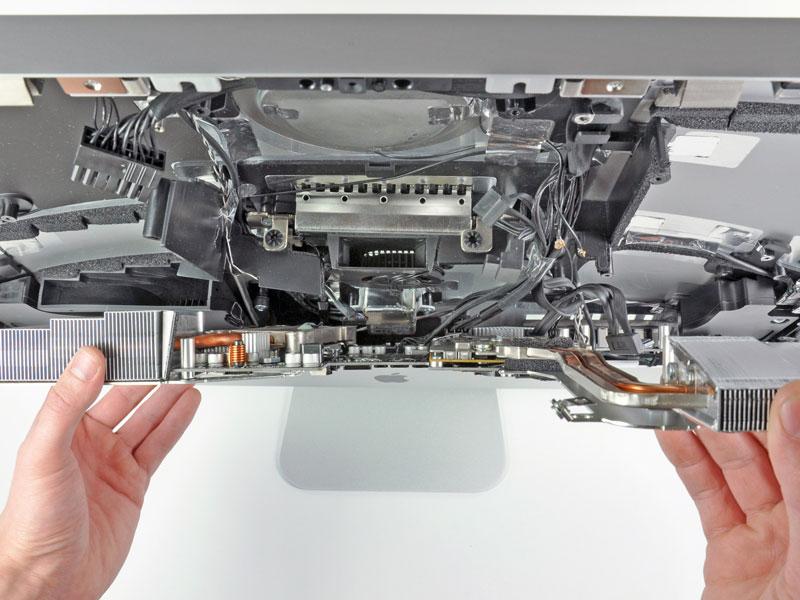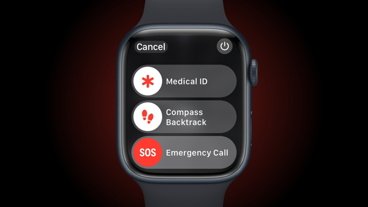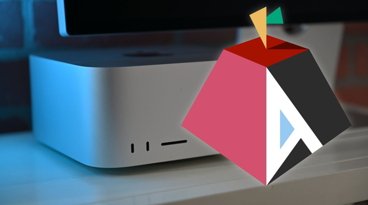The internal changes were noted on Thurdsay by Other World Computing, which found that the main 3.5-inch SATA hard drive bay in the new 2011 Thunderbolt-equipped iMacs has been modified significantly. Instead of a standard 4-pin power configuration, the drives in the new all-in-one desktop use a custom 7-pin configuration.
In addition, hard drive temperature control is reportedly detected through a combination of the new cable and proprietary firmware that Apple has on the hard drive itself.
"From our testing, we've found that removing this drive from the system, or even from the bay itself, causes the machine's hard drive fans to spin at maximum speed," the report said," and replacing the drive with any non-Apple original drive will result in the iMac failing the Apple Hardware Test."
The site tried a number of methods to circumvent the changes Apple has implemented in the new iMac, including swapping the main drive out with the same model drive, as well as a different solid-state drive. All testing so far has found that the Apple-branded hard drive not be removed or replaced.
In addition, though the iMac EFI Update 1.6 released earlier this month allows 6Gb/s speeds on two internal ports, the standard 7,200rpm drive that ships with the new iMacs cannot take advantage of those fast throughput speeds.
The site sells a "Turnkey Upgrade Program" that allows for hard drive upgrades on Mac hardware. While the service will not allow upgrades to the main drive, it can take advantage of an external eSATA port or allow additional, secondary hard drives to be added.
Apple's new quad-core Sandy Bridge iMacs with Thunderbolt ports debuted earlier this month. Users can configure the desktop to include both a standard spinning hard drive as well as a 256GB solid-state second drive, on which Mac OS X and all applications will come preinstalled.
The new iMacs were the first hardware to ship with Intel's new Z68 chipset, which allows for faster solid-state drive caching performance with hybrid drives or a combination of SSD and traditional drives. However, Apple's new iMacs do not take advantage of the new caching feature offered by the Z68 chipset.
 AppleInsider Staff
AppleInsider Staff







-m.jpg)






 Christine McKee
Christine McKee
 Charles Martin
Charles Martin
 Mike Wuerthele
Mike Wuerthele
 Marko Zivkovic
Marko Zivkovic
 Malcolm Owen
Malcolm Owen


 William Gallagher
William Gallagher


-m.jpg)






105 Comments
Perhaps they are trying to improve the acoustics. The main weakness in the iMac design from my perspective (and it is my favourite computer) is the way it situates the HD level with the user's face. Unless they are very careful what brand of HD they pick (and in the past they haven't been, mixing and matching presumably to get the best price) you can get quite a loud one.
In any event, perhaps with the new Thunderbolt ports you can just order it with an SSD and use a Thunderbolt drive which you put at your feet.
Thanks, Apple. I've been able to count on replacing most basic parts with a short visit to newegg.com. Not anymore, I guess.
On one side, I can understand Apple wanting to include extra diagnostics on the hard drive to improve performance and reliability. Can't fault them for that.
However, suddenly I'm finding myself quite happy with my Dec 2009 27" Quad i7 iMac with standard SATA connectors. I'm curious how Apple will respond to those wishing to upgrade the hard drives on their iMacs. I certainly plan on placing an SSD in my iMac as soon as the 512GB models drop more from there stratospheric prices.
I'm holding neutral on this until I hear more. Perhaps Apple has an inside scoop on the direction of hard drive interfaces and is planning ahead? Hmmm....
Not feeling warm and fuzzy on this one. \
All through the 80's and most of the 90's Apple loved to put proprietary hardware into their computers. Eventually, this design philosophy wound up biting them in the ass because their systems were too closed. With the advent of the first iMac, Apple seemed to embrace open standards, like USB. Gone were proprietary standards like ADB and localtalk.
Alas, with Apple's astounding success over the last decade has come an arrogance that believes that open standards are no longer in Apple's best interest. We saw this trend with the latest MacBook Air and its proprietary SSD. And now this. Apple will live to regret returning to its old bad habits.
Bonehead
.
Embracing open, commonly supported standards is what got Apple here. Now Apple wants to relive the nineties.